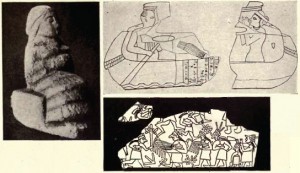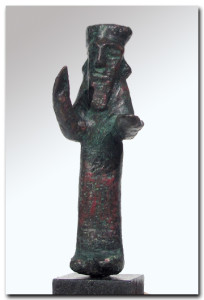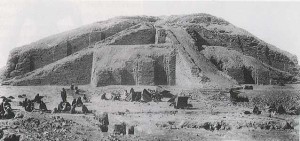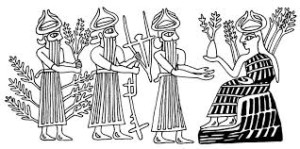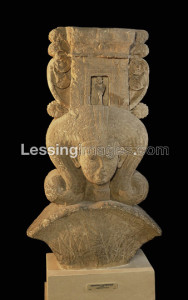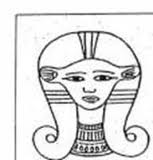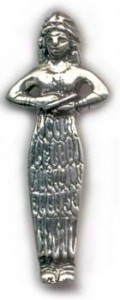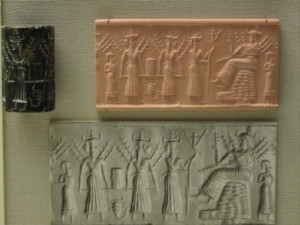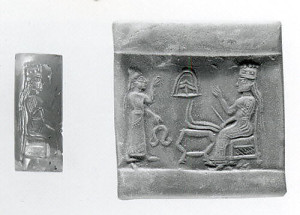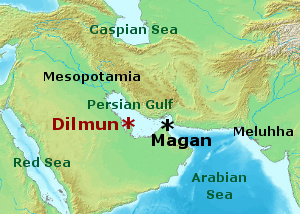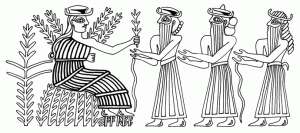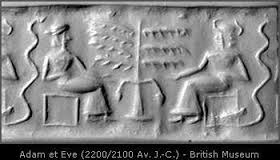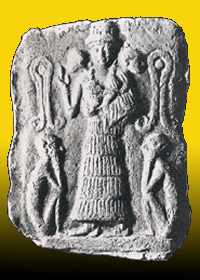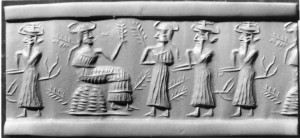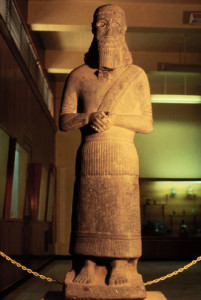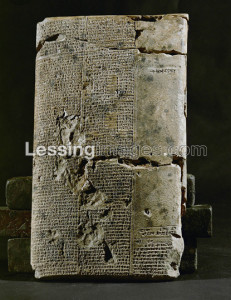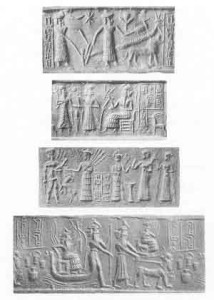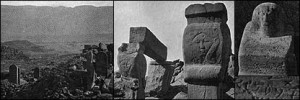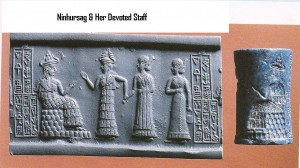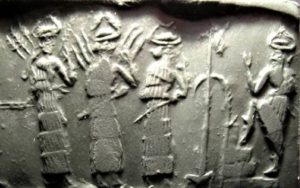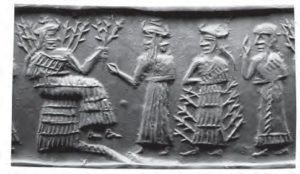(Texts: All Artifacts, Color Coding, & Writings in Bold Type With Italics Inside Parenthesis, are Added by Editor R. Brown, not the Authors, Translators, or Publishers!)
(gods in blue …mixed-breed demigods in teal…)
“He (Gilgamesh) .….. the audience-gifts for Enki, Ninki (Enki’s spouse),
Enmul, Ninmul, Endulkuga, Nindulkuga, Enindacurima, Nindacurima,
Enmu-utula, Enmencara, the maternal and paternal ancestors of Enlil;
for Cul-pa-ed (Ninurta),the lord of the table,
for Sumugan (god of the steppe) and Ninhursaja (Ninhursag),
for the Anuna (Anunnaki) gods of the Holy Mound, …”
Ninlil Quotes From Texts
Ninlil = Enlil’s spouse, Ningikuga’s / Nisaba’s & Enki’s daughter, sister to Ningal
Ningal Speaking in the 1st Person:
“‘Indeed, Enlil could be the best choice for you, dearest,
but he should ask your hand first to me and your father Haia’(Ninlil’s father).
‘Mother, if he is so special, tell me more about young Enlil‘ …”
“So she had bumped into Lord Enlil himself.
As befitting to her and his station, she bowed graciously and introduced herself.
‘I lend you graces, my Lord.
My name is Ninlil, a newcomer to your domains.
I am the daughter of Haia, Lord of the Stores and Numbarshegunu, the Goddess of Barley…”
“Would she know how to please him?
She had never kissed anyone in the mouth, she had never touched a man’s body in a sexual act.
Caution and shyness won over curiosity and desire.
‘You are too great for me, my lord. I am too young. I have never known a man.
My vagina is too narrow, my mouth still untutored. Choose another one!’
She said these words and fled to the welcoming waters of the canal which led to the river…”
“‘Never before was a daughter of An (Anu),
a Maiden of the Holy House so ill-treated by one of the Anunnaki.
The waters of Mother Nammu (Enki’s mother), the Source of Life, were defiled by one of her own.
May you stand trial, Enlil, for what you did to me.’…”
“I am called Ninlil, a Maiden of the Holy House of An, daughter of Haia,
God of the Stores and of the Barley Goddess Numbarshegunu.
I came alone and of my own free will to the Land of No Return
to intercede for the life of my lord, Enlil, the Air god,
who was sent to the Underworld because of a grave offense he did to myself…”
Ningal:
“Young Ningal lived out in the marshlands close to the ancient settlement of Eridu,
the beloved daughter of Ningikuga, the Goddess of Reeds, and Enki, the God of Magic, Crafts and Wisdom.
Slim, black-haired Ningal of eyes darker than a moonless night was quiet only in appearance, …”
“Ninlil, righteous woman of Enlil, you dwell in the Ki-ur…”
“‘I knew this day would come!’
Numbarshegunu (Nisaba) exclaimed overjoyed, hugging Ninlil affectionately.
‘May you be proud of your womanhood, may bring happiness as much as you receive,
may your body know and give pleasure in all worlds you dare to fare!
May you conceive of your womb, may you create of your own hands, mind, heart and soul!
Now, we should search for a worthy partner for you,…”
“Ninlil struggled in vain. He was much stronger.
Soon his mouth was in hers, his hands everywhere along her body, tearing her morning dress.
Then his member entered her vagina, breaking the sensitive skin that kept her maidenhood intact.
Ninlil released a shout of pain.
Then Enlil was inside her and moving to a rhythm of clouds pushed by early morning winds.
She twisted her thighs trying to escape,
but the discomfort gave way to an overwhelming sensation
that obliterated any rational thought as Enlil’s seed was spilled into her.
The feeling was so intense that Enlil stopped moving, stunned, to look into her face…”
“Ereshkigal, saw Enlil’s wrongdoing and heard the lament of the Maiden:
the Lady of the Great Below heeded the Maiden’s words.
She knew a door had been opened for Justice,
Growth and Regeneration in the Underworld
if only Enlil submitted to the Laws of the Land of No Return.
In Nippur, Ki, Mother Earth, also known as Urash, Ninmah, and Ninhursag
felt strongly that Enlil should suffer the hardest of all punishments for his conduct.
Never before had the Anunnaki taken to trial one of their own.
Shocked and circumspect, they gathered, and were forty-nine,
not the usual fifty in number, because Enlil was counted out for the first time.
In the lower platform sat 46 judges, in the higher was An, who presided all judgments,
sided by Ki (Antu is his mother, not Ninhursag) on his right and Enki on his left.
Father, Mother and Brother to Enlil they were,
but also the Guardians of the Attributes of Civilization, Law and Order.
The fourth high seat was empty.
It belonged to Enlil, the defendant.
Red-eyed Ninlil, sided by the healer goddess Gula
(Bau, Enlil’s sister and his daughter-in-law), sat quiet and dignified on the right.
On the left and opposite to her was Enlil, whose discomfort was evident for all to see…”
‘Yes, Ninlil, he is gone.
We hope it is for the time being, until he learns a deep lesson,
until he pays the price for what he did to you and all Creation’,
Enki answered softly, bowing to her.
‘Enlil has just crossed the threshold to the Underworld.’
Ninlil kept silence for a little while, as if gathering all her strength to do what she should.
“‘I’ll follow my lord to the bowels of the earth’, she said out loud.
‘And beyond if need be”, she thought to herself.
As these words came out, she too vanished from the assembly.
Surprised, but not afraid anymore, Ninlil saw herself at the very city gate
she had crossed twice this very morning.
A tunnel entrance lied a few yards away.
In she went through the brick-built walls downwards for a long time.
Down, always downwards, deeper and deeper below Ninlil went.
When she was about to ask whether she had done right
to follow the sudden impulse of her heart’s desire, she discovered a massive wooden door. A gate!
But when she stretched her hand to pull the heavy iron handle up, a hand prevented her to do so.
A tall, imposing figure, eyes light of color as the first breeze of the day met hers
‘Go back, my lady. The door to the Underworld is closed to you’.
So Ninlil had found the gate to the Depths Below and the doorkeeper…”
“You married Ninlil (Enlil’s spouse) , the holy consort, … lady of your choice….
who shares the holy throne, the pure throne with you,..”
“They brought him before God Enlil and Goddess Ninlil
Enlil brought forth from the sea his palace servant
And Ninlil brought forth from…. her….
When Enlil and Ninlil…..”
Ezina Quotes From Texts
Ezina = sometimes Ninlil
= sometimes Ninlil’s daughter
goddess of fertility and childbirth, spouse of Ellil / Enlil
Ezina As Ninlil:
“Nanibgal, the mother-in-law of Enlil,
the woman who had been slandered, was treated kindly by Nuska (?)
(1 ms. has instead: …… the mother-in-law of Enlil, the woman …… Ezina ……) —
but the lady disregarded the flatterer, and spoke to her daughter:…”
“( Enlil speaks:) ‘From now on, a woman shall be the ……;
a woman shall be the mistress of the house.
May my favorite wife (Ninlil), who was born by holy Nisaba, be Ezina, the grain, the life of the Land.
When she appears in the furrows like a beautiful young girl,’ …”
Ezina As Ninlil’s Daughter:
“It was then that the cupbearer of Ezina’s wine-house,
Sargon, lay down not to sleep, but lay down to dream.
In the dream, holy Inana drowned Ur-Zababa in a river of blood…”
“He made grain abundant in the furrows.
He made Ezina appear radiant as a beautiful maiden.
The harvest, the great festival of Enlil, rose heavenward…”
“may Enlil my lord and Ninlil my lady curse that man!
May Enki, Ickur (Ishkur / Adad), Ezina, Cakkan (animal deity), the lords of abundance, ……”
“The grain became thick in the furrows.
Ezina came forth in splendor like a beautiful maiden…”
“may you be Ezina, who beautifies ……, may you be a nursing mother of the womb,…”
“May your grain be returned to its furrow, may it be grain cursed by Ezinu!…”
Ninmul Quote From Text
Ninmul = Ninlil, Enlil’s spouse, daughter of Nisaba
“He (Gilgamesh) …… the audience-gifts for Enki, Ninki, Enmul, Ninmul,
Endulkuga, Nindulkuga, Enindacurima, Nindacurima, Enmu-utula, Enmencara,
the maternal and paternal ancestors of Enlil;
for Cul-pa-ed, the lord of the table, for Sumugan and Ninhursaja (Ninhursag),
for the Anuna (Anunnaki) gods of the Holy Mound,…”
“the Enki and Ninki deities; Enmul and Ninmul…”
“A violent storm blew over Umma, brickwork in the midst of the highlands.
Cara (Shara, Inanna’s son) took an unfamiliar path away from the E-mah,
his beloved dwelling.
Ninmul cried bitter tears over her destroyed city.
“Oh my city, whose charms can no longer satisfy me,” she cried bitterly…”
Sud Quotes From Texts
Sud = Ninlil, Enlil’s spouse
mother of Nannar & Adad
“Curupppag (Shuruppak), was given to Sud…”
“from now on, Sud …… Ninlil …….”
“Proud woman, surpassing the mountains!
You who always fulfill your desires — from now on, Sud,
Enlil is the king and Ninlil is the queen.
The goddess without name has a famous name now, ……”
“( Nuska speaks:) ‘…… Sud …….
What you have told me’ …….”
“Tell Enlil, the Great Mountain: ‘Do as you wish!’
Let his sister come from her side,and she shall accompany Sud from here.
Aruru (Ninhursag) shall become Sud’s sister-in-law: let her be shown the household…”
Lady Air Quotes From Texts
Lady Air = Ninlil, spouse to Lord Air Enlil
“I’ll share my power with you, Lady Air,…”
“So lay with me, Lady Air (Ninlil),
and share with me all the passion that you have locked inside…”
“Lay with me, lady Air, and share a night of passion by the cataract.
I need your care to guide me through this lonely night’.
‘Will you carry me afterwards, as you did… to Enlil?’
‘Yes’. Ninlil reached out for the Guardian of the Devouring River and kissed him in the mouth…”
Beltis Quotes From Texts
Beltis = Inanna sometimes
= Ninlil sometimes
Beltis As Ninlil:
“Beltis (Ninlil), the wife of Bel (Enlil), mother of the (great) gods;…”
“to gratify (?) the temple of Beltis (Ninlil)
the great wife, the favorite of Asur (Osiris / Orien) my lord,
Anu, Rimmon (Adad) (and) Ishtar (Inanna) Of Assur,
as well as the palaces of my city Assur…”
Beltis As Inanna:
“In those days the pavement of the house of Ishtar, my lady,
with squared stone well-hewn its fabric I made great for ever.
Beltis (Ishtar / Inanna), may this pavement be accepted before thee!…”
“Beltis (Inanna), lady of the lands, who dwells in E-barbar..”
“E-barbar, the house of Ishtar (Inanna) of Nineveh…”
“a temple to Ninip my Lord I therein founded;
when an image of Ninip (Ninurta) himself which had not been made before,
in the reverence of my heart for his great mighty god-ship,
of mountain stone and brilliant gold I caused to make in its completeness;…
an altar to Ninip my Lord I therein consecrated:
a temple for Beltis (Inanna), Sin (Nannar), and Gulanu (Bau / Gula),
Hea-Manna (Enki?) and Yav (Adad) great ruler of heaven and earth I founded…”
Enbilulu Quotes From Texts
Enbilulu = Enlil’s & Ninlil’s son
river warden
“Enlil, as Silulim had her lie down in the latter’s chamber,
made love with her, kissed her; and at his lovemaking, at his first kiss,
he poured into the womb for her the sperm, germ of Enbilulu, the river warden!…”
“he poured into her womb the seed of Enbilulu, the inspector of canals…”
“The lord who decrees the fate, Enki the king of the Abzu,
Enbilulu, the inspector of canals, [Enki] placed in charge of them…”
Ennugi Quotes From Texts
Ennugi = Enlil’s son, sheriff of the Anunnaki
“I’ll call this seed of yours Ennugi, Lord of the Sexual Parts’,
said Ninlil when intercourse was over.
She kissed the ferryman in the mouth…”
“Their counselor was hero-Enlil…
And their sheriff was Ennugi…”
“and your sheriff [Ennugi]…
Ninurta, and your bailiff Ennugi have sent me to say:…”
“Nuska…You issue orders for Ennugi (Enlil’s son, sheriff of the Anunnaki). …”
Ninmada Quotes From Texts
Ninmada = Enlil’s son, Ninazu’s brother
“Then Ninazu (son of Enlil sometimes, son of Ereshkigal sometimes)……,
and said to his brother Ninmada:…”
“Let us fetch the barley down from its mountain,
let us introduce the innuha barley into Sumer.
Let us make barley known in Sumer, which knows no barley….”
“Ninmada, the worshipper of An (Anu), replied to him:
‘Since our father has not given the command,
since Enlil has not given the command,
how can we go there to the mountain?
How can we bring down the barley from its mountain?’…”
“Let Ninmah (Ninhursag) act as your assistant;
and let Ninimma, Cu-zi-ana, Ninmada, Ninbarag, Ninmug, ……
and Ninguna stand by as you give birth…”
Ninsutu Quotes From Texts
Ninsutu / Ningiriudu / Ningirida = Enki’s & Ninhursag’s daughter via Uttu
Ninazu’s spouse, Enlil’s daughter-in-law, Ningishzidda’s mother(?)
As Ningirida:
“Ninjiczida (Ningishzidda), who brings together giant snakes and dragons!
Great wild bull who, in the murderous battle, is a flood that ……!
Beloved by his mother,
he to whom Ningirida gave birth from her luxurious body,
who drank the good milk at her holy breast,
who sucked in lion’s spittle, who grew up in the abzu!…”
“Praise be to Enki. Ninjiczida, son of Ninazu (?, son to Enki)!…”
“Lady Ningirida, say to you: ‘Your house, your city!’
as she steps before you in prayer, god of the Land, my lord Ninazu!…”
“Enegir lay ahead of the offerings, Urim lay behind them.
She brought out of the house what should not come out of the house,
what should not come out of the house —
Ningirida (Ninazu’s spouse) brought out of the house
what should not come out of the house:
‘Welcome, welcome, welcome o boat!
O boat of Suen, welcome, welcome o boat!’
She laid out flour before the barge and spread bran.
At her feet stood a covered bronze gakkul vat. (1 ms. adds 1 line:
With her fingers she pulled out the boxwood bung (?) for him (declaring):)
‘I shall rub precious oil on this peg.
May ghee, syrup and wine be abundant in your midst,
may the suhur carp and the ectub carp rejoice at the prow of your boat!’
But the boat did not give her its cargo: ‘I am going to Nibru!’…”
Ningirida As Ningiriudu:
(Ninhursag speaking) “’My brother, what part of you hurts you?’
(Enki speaking) ‘My nose (giri) hurts me.’
She gave birth to Ningiriudu out of it…”
“Ningiriudu shall marry Ninazu,…”
Ningirida As Ninsutu:
“Let Ninsutu marry Ninazu;…”
“’Where else do you hurt, dearest (Enki)?’
‘My tooth hurts me.’
‘To the goddess Ninsutu
I (Ninhursag) have given birth for you to set your tooth free’…”
Ezina-Kusu Quotes From Texts
Ezina-Kusu = sometimes Enlil & Ninlil’s daughter
= sometimes Nisaba
sometimes Enlil’s daughter, sometimes Enlil’s mother-in-law Nisaba, Ninlil’s mother, grain goddess
Ezina-Kusu As Enlil’s daughter:
“I am Ezina–Kusu (Grain) ; I am Enlil’s daughter…”
“A plant sweeter than a husband, a plant sweeter than a child:
may Ezina-Kusu (a goddess of grain) dwell in your house….”
Ezina-Kusu As Nisaba:
“ ...Nisaba…amid her awe-inspiring splendor, still she weeps.
Amid her awe-inspiring splendor, still Mother Ezina-Kusu weeps.
Fate and fortune! Amid her awe-inspiring splendor, still she weeps.
A cir-namcub of Nisaba…”
“may Ezina-Kusu (the goddess of grain) be your aid.
May you have an eloquent protective goddess…”
Kusu Quotes From Texts
Kusu = Enlil’s daughter, Gibil’s spouse
“Kusu establishes the lustration rituals created in their specific house —
the oven for oxen, sheep and bread beside the interior of the bathing chamber (?),
those sacred lustration rituals beside the shrine!
Kusu purifies the oil for the house.
It is placed in readiness and the limbs are …….
To ensure the sacred lustration rituals are not neglected,..”
“In their …… Kusu has consecrated the ……, she has purified the oven.
……, she has filled the …… purified …….
Kusu has then put numerous bulls and numerous sheep into the great oven.
Kusu has then put numerous bulls and numerous loaves into the great oven…”
“From Eridug (?) praise to lady Kusu, the princess of the holy abzu, …….”
“O Nun-bar-ana (Gibil?, spouse to Kusu), angry avenger (?) ……,
bringing forth the great torch from the abzu,
lifting his head with the noble divine powers!…”
“So that you should place sacred hands upon your offering table
in the banqueting hall, the great place, your steward Kusu —
she who purifies hands and cleanses hands — consecrates the hands…”
Suziana Quotes From Text
Suziana /Cuziana = Enlil’s junior wife, under Ninlil
possibly one of Ninhursag’s nurses
“Šu-zi-ana, the junior wife of father Enlil, has erected a house in your precinct,
O Du-saĝ-dili, and taken her seat upon your dais.
the house of Šu-zi-ana in Ĝa-gi-ma…”
“Let Ninmah (Ninhursag) act as your assistant;
and let Ninimma, Cu-zi-ana, Ninmada, Ninbarag, Ninmug,……
and Ninguna stand by as you give birth…”
Haia Quotes From Texts
Haia = Ninlil’s father, spouse to Nisaba, Enlil’s father-in-law
god of the stores
“Haia, I will declare your greatness perpetually!
Who among the gods is fitted like you for the holy divine powers?
Your beloved spouse is the maiden Nisaba, the great queen of queens.
Ninlil (Enlil’s spouse), who was born of her holy womb,…”
“My name is Ninlil, a newcomer to your domains.
I am the daughter of Haia, Lord of the Stores
and Numbarshegunu, the Goddess of Barley….”
“Haia, who holds the great tablets, who enriches wisdom with wisdom!
Accountant of Hal-an-kug,
having the final overview of the arts of Nisaba’s house of wisdom…
seal-holder of Father Enlil!
He who brings forth the holy objects from the treasure-house of E-kur…”
“Haia, who wears the ceremonial robe during pure lustrations of the engur!
Indagara, administrator who performs the opening of the mouth
for the gods in the heavens and in the underworld,
and who is versed in the meaning of obscure tablets;
craftsman of the great gods!…”
“Enlil, Lord Air, comes often to the canal and the riverbank
to kiss the fertile lands with the power of his breath that makes everything grow.
Indeed, Enlil could be the best choice for you, dearest,
but he should ask your hand first to me and your (Ninlil’s) father Haia….”
“I am called Ninlil, a Maiden of the Holy House of An, daughter of Haia,
God of the Stores and of the Barley Goddess Numbarshegunu…”
“Haia, linen-clad priest of E-unir, who stocks the holy animal-fattening pens;
learned scholar of the shrine E-kic-nujal,
whose august name is great, whose mind is discerning;
who dwells in the great dining-hall alongside the maiden Ningal (Nannar’s spouse)!
Fair of features, beloved spouse of Nun-bar-ce-gunu
and augustly renowned father-in-law of father Enlil the Great Mountain;
junior administrator, possessor of wisdom, acknowledged in heaven and earth,
who receives the tribute for the gods,…”
“Ur- Ninmarki, the scribe and scholar:
……, his personal gods were Haya (Nisaba’s spouse)
and Nisaba, he acted for X + 20 years…”
Enmecera Quote From Text
En-me-cara = Enlil’s uncle
(Namzidtara speaking to Enlil):
“’When your uncle En-me-cara was a captive,
after taking for himself the rank of Enlil, he said:
‘Now I shall know the fates, like a lord.’…”
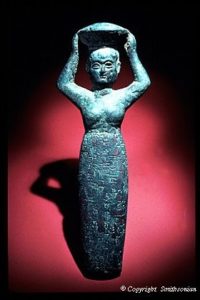 (Nisaba, Master Scribe, Enlil’s mother-in-law, grain goddess, another mother to offspring of Enki)
(Nisaba, Master Scribe, Enlil’s mother-in-law, grain goddess, another mother to offspring of Enki)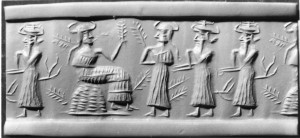 (Nisaba, daughter Ninlil, & 2 unidentified gods, Nisaba-goddess of grain, & spouse Haia-god of barley, brought down & established grains upon the Earth)
(Nisaba, daughter Ninlil, & 2 unidentified gods, Nisaba-goddess of grain, & spouse Haia-god of barley, brought down & established grains upon the Earth)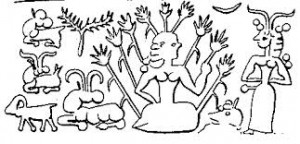 (Nisaba, Goddess of Grain & daughter Ninlil)
(Nisaba, Goddess of Grain & daughter Ninlil) 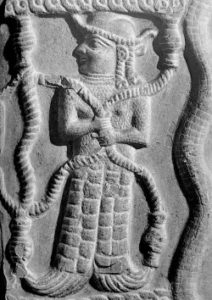 (Ninhursag, King Anu’s daughter, mother to many gods & goddesses)
(Ninhursag, King Anu’s daughter, mother to many gods & goddesses)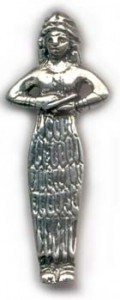
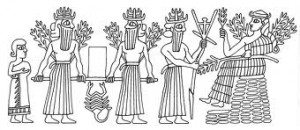
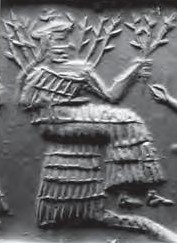
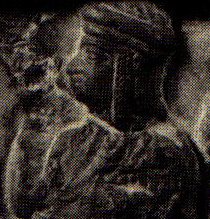
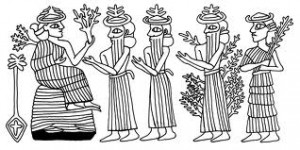
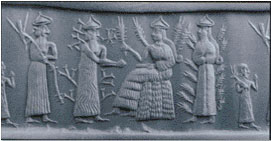
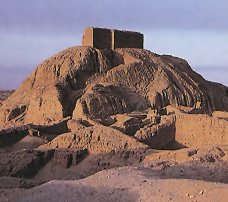
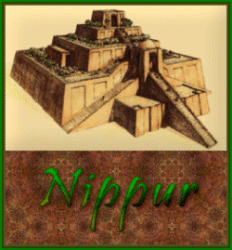
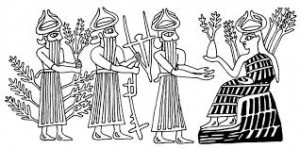
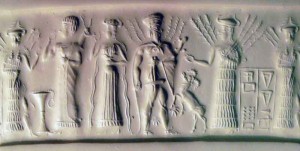
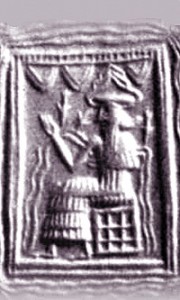
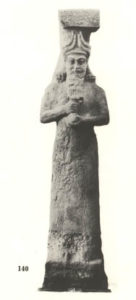
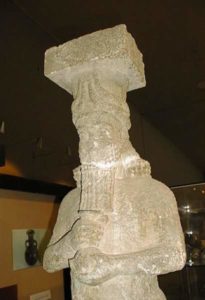
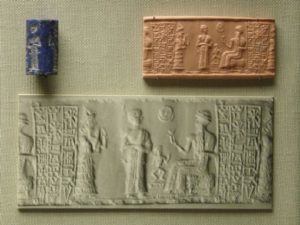
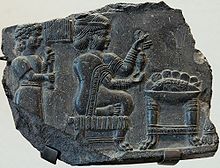
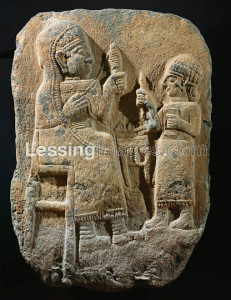
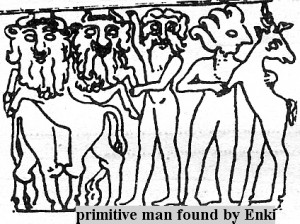
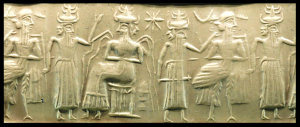
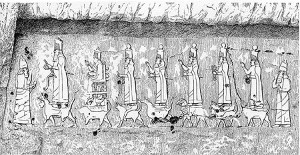
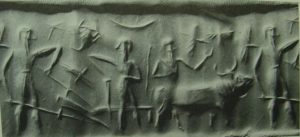 (early farming on Earth Colony)
(early farming on Earth Colony)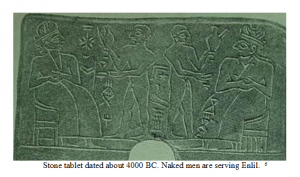
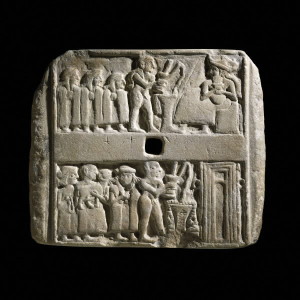
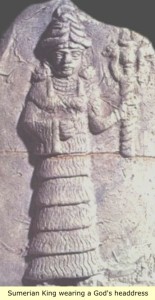
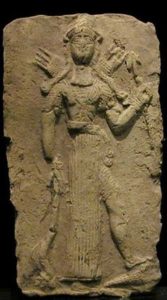
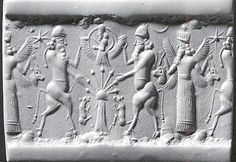
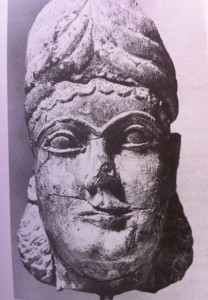
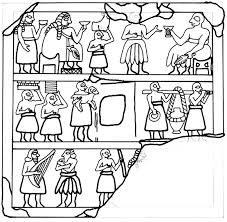
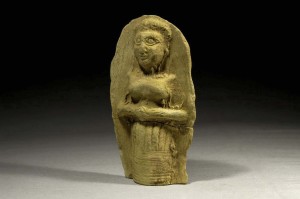
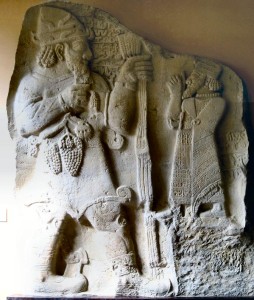
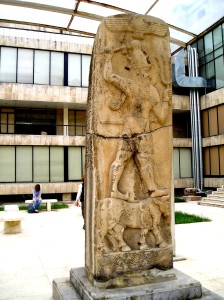
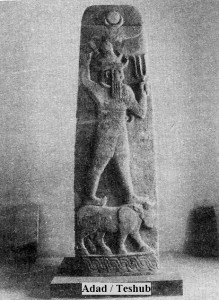
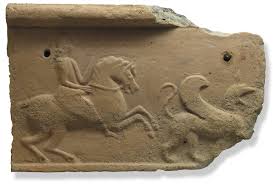
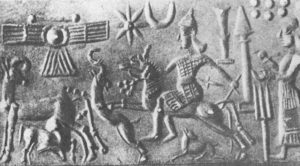
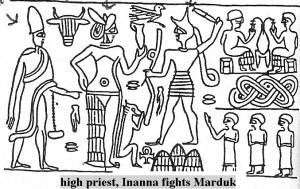
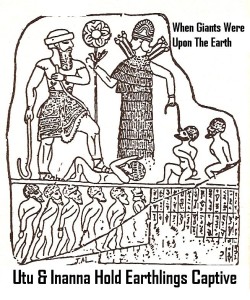
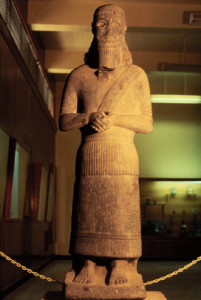
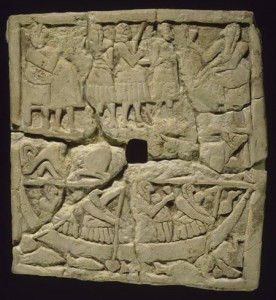
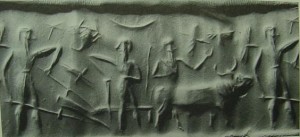
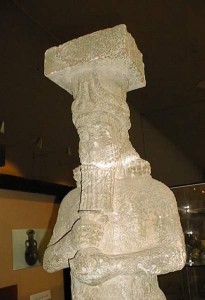
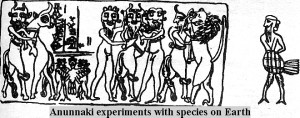
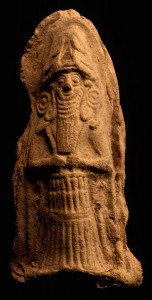
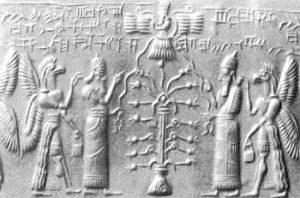
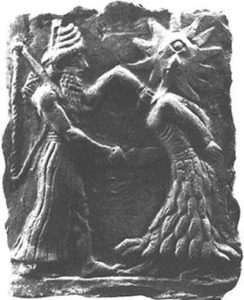

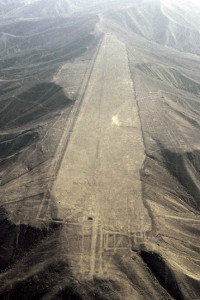
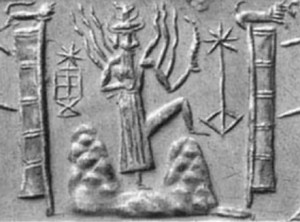
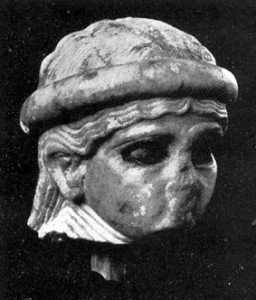
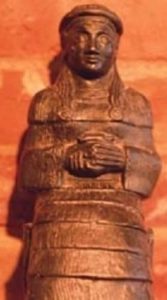

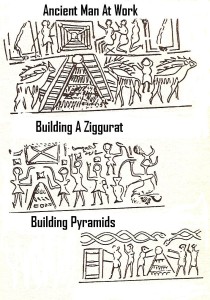
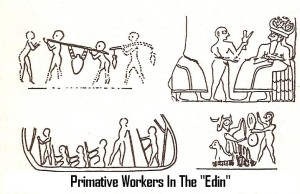
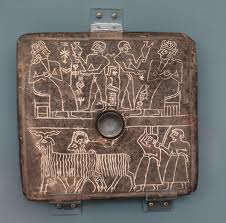
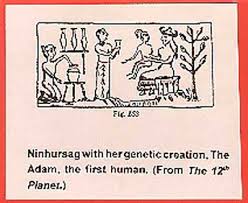
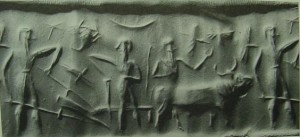
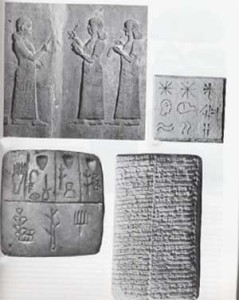
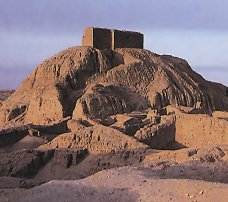
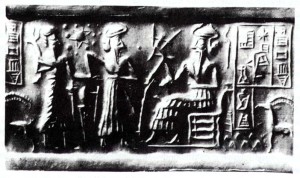
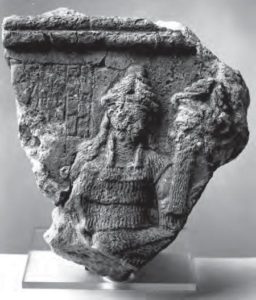
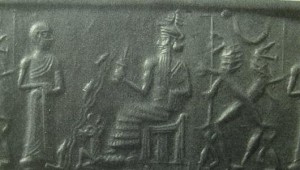
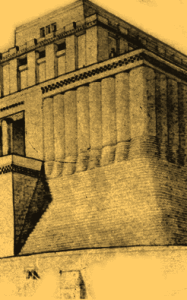
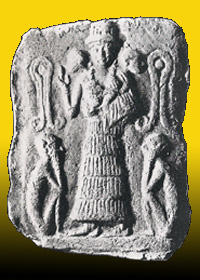
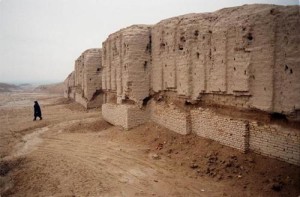
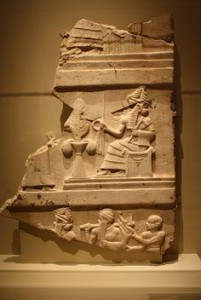
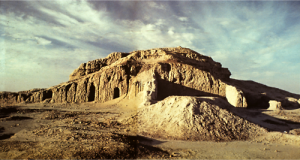
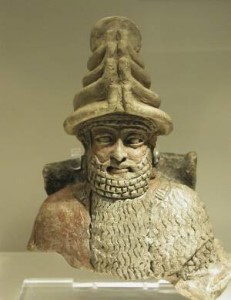
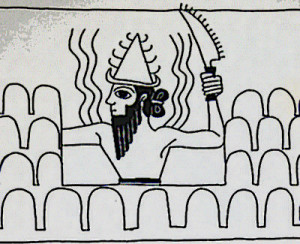
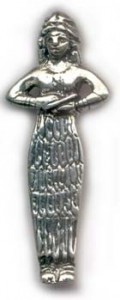
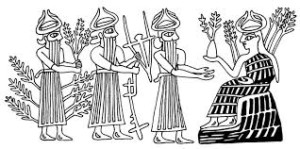
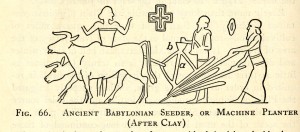
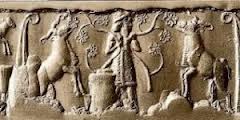
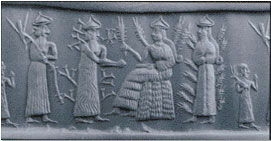
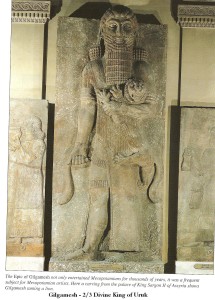
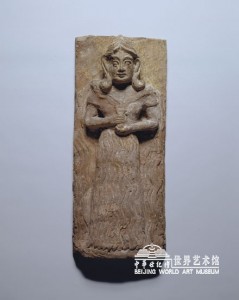
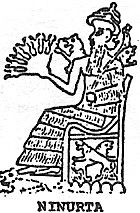
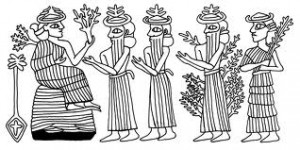
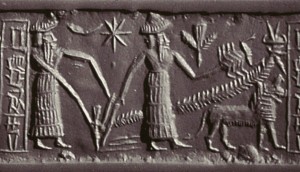
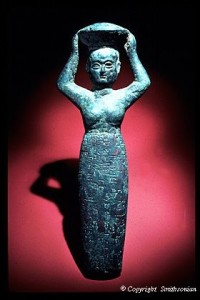
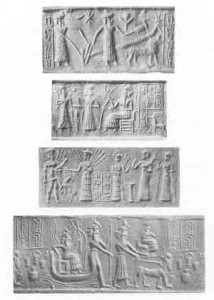
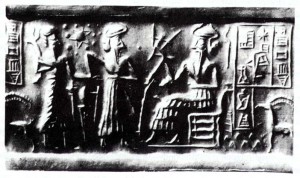
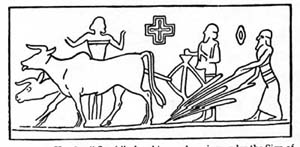
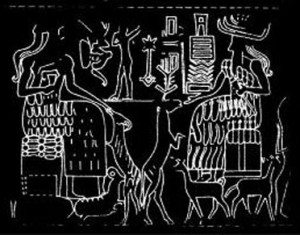
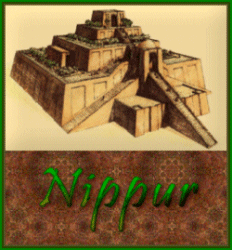
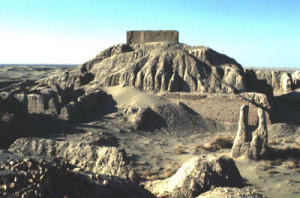
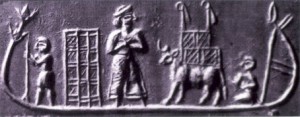
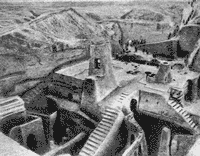
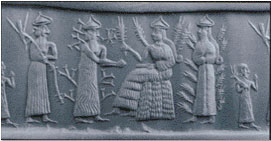
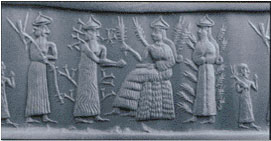
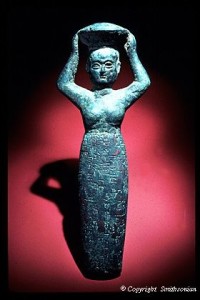
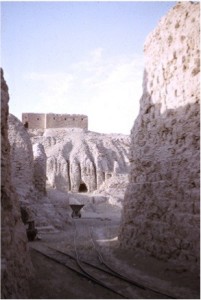 (
(